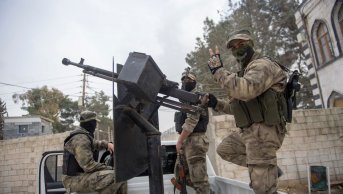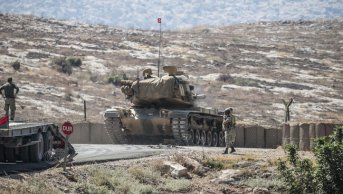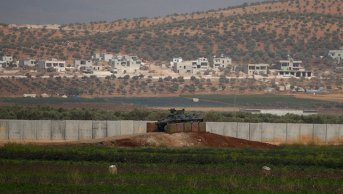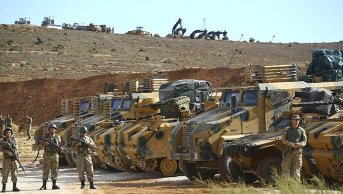There is a Right Way to Avert the Worst Humanitarian Tragedy in Syria: NATO Partners Must Coordinate
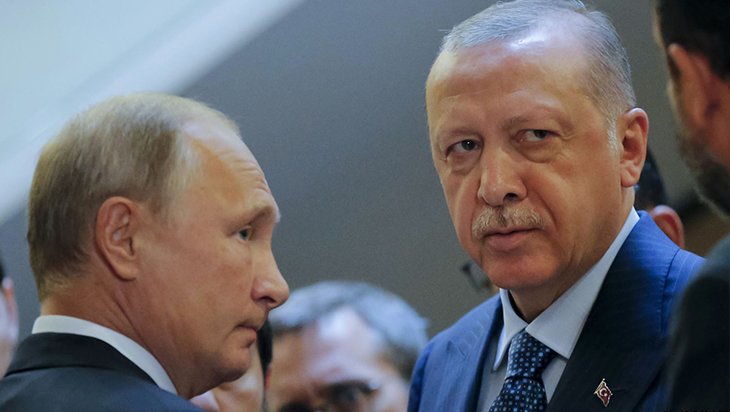
On Saturday 24th of November 2018, pro-Assad forces bombed residential neighborhood in Jarjanaz; in eastern countryside of Idlib. The heavy artillery had hit school children at al-Khansaa school, leaving 7 students and 2 women dead; as well as tens who were seriously injured. Bombing Jarjanaz is not the first violation of the Sochi Accord’s provisions: based on sources, violations conducted by pro-Assad forces to the accord, had reached 129 attacks and operations on de-militarized areas. That would put the Sochi accord at a stake.
The ongoing violations of pro-Assad forces need permanent agreement to protect civilians in Idlib and adjacent areas. This can be reached through a close-coordination between NATO members particularly Turkey and European governments, so, to urge Russia and Iran (Assad’s patrons), to resume the political process and avert the worst humanitarian crisis in Syria since the beginning of the civil war.
Sochi Accord to protect civilians in Idlib:
After almost eight years since the Syrian civil war outset in 2011, Assad’s regime has retaken many areas in Syria; including three areas that had been designated as “de-escalation zones” in the fifth Astana talks- in May 2017. The three areas are: Rastan and Talbiseh, where 180,000 civilians live; Eastern Ghouta, with population of around 690,000 civilians; and parts of Deraa and Quneitra provinces, with approximate population of 800,000 civilians. Based on several reports, pro-Assad forces have used barrel bombs and chlorine gas, supported by Iranian militias and Russian air strikes; resulting in severe death toll and causalities among civilians. Moreover, the bombing resulted in evacuating those cities; causing new waves of refugees heading to Idlib; a city in northwestern Syria, and the fourth de-escalation area.
By hosting hundreds of thousands of people, Idlib, and adjacent towns, have become, by August 2018, heavily populated, with around 3.867.663 persons. At the same time, it has been expected to be the next target for Assad forces.
Amid such context, and with significant diplomatic efforts by Turkey and warnings issued by the United States and European countries, particularly Germany and France to Assad’s regime, Turkish president has signed an accord with Russian president in September 17th; to prevent a humanitarian disaster and new refugee flows.
The accord that has been signed in a Black Sea city in Russia, Sochi, stipulates urgent arrangements in which a demilitarized buffer zone has been created between pro-Assad forces and Syrian factions in Idlib; that comprises a strip of 15 and 20 kilometers.
The majority of Syrian factions accepted the accord (either implicitly or explicitly) and were considered committed to its requirements, withdrawing their heavy weaponry from demilitarized zone by October 10, 2018. On the other hand, some part of extremist factions, under the Turkish pressure, left the zone by mid-October, albeit some challenges to fulfill this requirement are still there. Nevertheless, pro-Assad forces have continued their assaults on residents in the ceasefire zone; as well as operations against checkpoints under factions’ control.
The most critical operation has occurred in November 9th, by pro-Assad forces; mainly affiliated to Iranian Revolutionary Guard. The forces attacked the Zallaqat checkpoint and killed around 20 fighters of Jaish al-Ezza (Al-Ezza Army), one of the factions that had fulfilled the accord requirements. That in turn, has yielded undesirable repercussions: some armed factions conducted counter-limited-operations targeting pro-Assad forces locations; emphasizing the discourse of the extremist groups, that criticized factions who accepted Sochi accord and portrayed them as betrayers to martyrs’ blood, and underscored that there are no political solutions but only armed. This has further led to increasing death and causalities among civilians as a result of shelling and air-strikes, which consequently created doubts about the accord’s validity: rumors spread speculating that it is just a step to “give” Idlib to the regime; exactly like what had happened in other de-escalations cities!
Istanbul path for political solution should be endorsed:
The Sochi Accord was considered a successful step towards strengthening the political solution in Syria, in a moment where the international community was holding its breath. It came as a result of intensive Turkish efforts, alongside European pressures on Russia to rein in Assad’s forces, alongside Iranian and Hizballah militias, to launch a full-scale military campaign on Idlib.
Indeed, the Sochi agreement has prevented bloodshed, as well as tremendous waves of refugees on the Turkish borders- given that millions of Syrians have already been displaced from their home cities and have nowhere left to escape within Syria. At the same time, Turkey, within its slow recovery from currency crisis, has already been burdened with about 3 million Syrian refugees.
In this respect, the sustainability of the Sochi agreement should not be the responsibility of Turkey alone, but rather the international community. Needless to say, that the repercussions of pro-Assad forces military assaults on Idlib and adjacent areas, last stronghold of Syrian revolutionaries and armed forces, would not be terminated in few days, and the cost would be high on all levels. Idlib area has become a hub for more than 50000 fighters, affiliated to different political backgrounds. This implies that if the sporadic operations and counter-operations have turned to open-armed-battles between pro-Assad forces and Syrian armed factions, the worst humanitarian catastrophe is to be expected. At the same time, Idlib is the nucleus of Syrian civil society organizations and activists, which has been rebuilt from the ash of the civil war. So, if a full-scale military escalation goes ahead, the infrastructure will be destroyed and all the investment that has been spent, by Europe, U.S. and Turkey, would be totally lost.
The situation requires close coordination between Turkey and its NATO allies to prevent falling into the abyss. The recent improvement in relationships between Turkey from one side and its European partners from the other, should be reflected in developing a common understanding on managing the conflict in Syria; to redirect it to political settlement based on the UN Security Council resolution 2254 and Geneva communique.
It also requires moving beyond differences, in other issues not related to Syria, and closely coordinate their policies, positions and actions for political settlement in Syria. In fact, working in isolation from each other, in which each one talks and takes actions- with/to Assad and Russia, is only minimizing the leverages of both. In fact, it has been weakening their influence before Russia, that has exerted pressures on Turkey and Europe to normalize the relationship with Assad; or at least accepting to fund reconstruction program without political transitions, and of course final settlement.
Re-taking some Syrian areas by military activity, does not give a real control to Assad on them. “The Useful Syria”, that Assad has attempted to form, would not be stable, and would not bring peace to the already troubled region. His control is vulnerable, as the drivers of uprising are sustained. In the same vein, Russia cannot fund the reconstruction plan for Syria, and will not do it without Europe. Also, Russia would not risk a confrontation with Turkey: that has already consolidated its observation posts in the demilitarized zones. In this respect, it is time for Turkey and Europe, particularly Germany and France, to work together in harmony to restore the political process and pressure on Astana guarantors, i.e. Russia and Iran; to commit to political solution in Syria.
To this end, Istanbul Summit that has been held in 27 October should be the first step towards such a close coordination between NATO partners in particularly Turkey, Germany and France (open it to include the U.S as well). Istanbul path should be seen as a continuation to Geneva talks, to transfer the Sochi deal on Idlib to a permanent agreement, that preserves Idlib and renews the political process towards reaching a political settlement to Syrians. It should also entail series of serious negotiations, that have concrete timeframe, among political representatives of Syrian conflicting parties, alongside with representatives of Turkey-Europe front and Russia; on several issues, starting with constitutional committee, and ending with elections and replacing of Assad by a consensual person. With appointing a new United Nations envoy to Syria, Geir Pedersen, Istanbul path for political settlement should be given impetus by which Turkey-Europe front can likelihood take the lead and work for a major influence on the situation in Syria. This could pave the road for political transitions towards a political settlement that puts an end to the humanitarian tragedy in Syria.
On Saturday 24th of November 2018, pro-Assad forces bombed residential neighborhood in Jarjanaz; in eastern countryside of Idlib. The heavy artillery had hit school children at al-Khansaa school, leaving 7 students and 2 women dead; as well as tens who were seriously injured. Bombing Jarjanaz is not the first violation of the Sochi Accord’s provisions: based on sources, violations conducted by pro-Assad forces to the accord, had reached 129 attacks and operations on de-militarized areas. That would put the Sochi accord at a stake.
The ongoing violations of pro-Assad forces need permanent agreement to protect civilians in Idlib and adjacent areas. This can be reached through a close-coordination between NATO members particularly Turkey and European governments, so, to urge Russia and Iran (Assad’s patrons), to resume the political process and avert the worst humanitarian crisis in Syria since the beginning of the civil war.
Sochi Accord to protect civilians in Idlib:
After almost eight years since the Syrian civil war outset in 2011, Assad’s regime has retaken many areas in Syria; including three areas that had been designated as “de-escalation zones” in the fifth Astana talks- in May 2017. The three areas are: Rastan and Talbiseh, where 180,000 civilians live; Eastern Ghouta, with population of around 690,000 civilians; and parts of Deraa and Quneitra provinces, with approximate population of 800,000 civilians. Based on several reports, pro-Assad forces have used barrel bombs and chlorine gas, supported by Iranian militias and Russian air strikes; resulting in severe death toll and causalities among civilians. Moreover, the bombing resulted in evacuating those cities; causing new waves of refugees heading to Idlib; a city in northwestern Syria, and the fourth de-escalation area.
By hosting hundreds of thousands of people, Idlib, and adjacent towns, have become, by August 2018, heavily populated, with around 3.867.663 persons. At the same time, it has been expected to be the next target for Assad forces.
Amid such context, and with significant diplomatic efforts by Turkey and warnings issued by the United States and European countries, particularly Germany and France to Assad’s regime, Turkish president has signed an accord with Russian president in September 17th; to prevent a humanitarian disaster and new refugee flows.
The accord that has been signed in a Black Sea city in Russia, Sochi, stipulates urgent arrangements in which a demilitarized buffer zone has been created between pro-Assad forces and Syrian factions in Idlib; that comprises a strip of 15 and 20 kilometers.
The majority of Syrian factions accepted the accord (either implicitly or explicitly) and were considered committed to its requirements, withdrawing their heavy weaponry from demilitarized zone by October 10, 2018. On the other hand, some part of extremist factions, under the Turkish pressure, left the zone by mid-October, albeit some challenges to fulfill this requirement are still there. Nevertheless, pro-Assad forces have continued their assaults on residents in the ceasefire zone; as well as operations against checkpoints under factions’ control.
The most critical operation has occurred in November 9th, by pro-Assad forces; mainly affiliated to Iranian Revolutionary Guard. The forces attacked the Zallaqat checkpoint and killed around 20 fighters of Jaish al-Ezza (Al-Ezza Army), one of the factions that had fulfilled the accord requirements. That in turn, has yielded undesirable repercussions: some armed factions conducted counter-limited-operations targeting pro-Assad forces locations; emphasizing the discourse of the extremist groups, that criticized factions who accepted Sochi accord and portrayed them as betrayers to martyrs’ blood, and underscored that there are no political solutions but only armed. This has further led to increasing death and causalities among civilians as a result of shelling and air-strikes, which consequently created doubts about the accord’s validity: rumors spread speculating that it is just a step to “give” Idlib to the regime; exactly like what had happened in other de-escalations cities!
Istanbul path for political solution should be endorsed:
The Sochi Accord was considered a successful step towards strengthening the political solution in Syria, in a moment where the international community was holding its breath. It came as a result of intensive Turkish efforts, alongside European pressures on Russia to rein in Assad’s forces, alongside Iranian and Hizballah militias, to launch a full-scale military campaign on Idlib.
Indeed, the Sochi agreement has prevented bloodshed, as well as tremendous waves of refugees on the Turkish borders- given that millions of Syrians have already been displaced from their home cities and have nowhere left to escape within Syria. At the same time, Turkey, within its slow recovery from currency crisis, has already been burdened with about 3 million Syrian refugees.
In this respect, the sustainability of the Sochi agreement should not be the responsibility of Turkey alone, but rather the international community. Needless to say, that the repercussions of pro-Assad forces military assaults on Idlib and adjacent areas, last stronghold of Syrian revolutionaries and armed forces, would not be terminated in few days, and the cost would be high on all levels. Idlib area has become a hub for more than 50000 fighters, affiliated to different political backgrounds. This implies that if the sporadic operations and counter-operations have turned to open-armed-battles between pro-Assad forces and Syrian armed factions, the worst humanitarian catastrophe is to be expected. At the same time, Idlib is the nucleus of Syrian civil society organizations and activists, which has been rebuilt from the ash of the civil war. So, if a full-scale military escalation goes ahead, the infrastructure will be destroyed and all the investment that has been spent, by Europe, U.S. and Turkey, would be totally lost.
The situation requires close coordination between Turkey and its NATO allies to prevent falling into the abyss. The recent improvement in relationships between Turkey from one side and its European partners from the other, should be reflected in developing a common understanding on managing the conflict in Syria; to redirect it to political settlement based on the UN Security Council resolution 2254 and Geneva communique.
It also requires moving beyond differences, in other issues not related to Syria, and closely coordinate their policies, positions and actions for political settlement in Syria. In fact, working in isolation from each other, in which each one talks and takes actions- with/to Assad and Russia, is only minimizing the leverages of both. In fact, it has been weakening their influence before Russia, that has exerted pressures on Turkey and Europe to normalize the relationship with Assad; or at least accepting to fund reconstruction program without political transitions, and of course final settlement.
Re-taking some Syrian areas by military activity, does not give a real control to Assad on them. “The Useful Syria”, that Assad has attempted to form, would not be stable, and would not bring peace to the already troubled region. His control is vulnerable, as the drivers of uprising are sustained. In the same vein, Russia cannot fund the reconstruction plan for Syria, and will not do it without Europe. Also, Russia would not risk a confrontation with Turkey: that has already consolidated its observation posts in the demilitarized zones. In this respect, it is time for Turkey and Europe, particularly Germany and France, to work together in harmony to restore the political process and pressure on Astana guarantors, i.e. Russia and Iran; to commit to political solution in Syria.
To this end, Istanbul Summit that has been held in 27 October should be the first step towards such a close coordination between NATO partners in particularly Turkey, Germany and France (open it to include the U.S as well). Istanbul path should be seen as a continuation to Geneva talks, to transfer the Sochi deal on Idlib to a permanent agreement, that preserves Idlib and renews the political process towards reaching a political settlement to Syrians. It should also entail series of serious negotiations, that have concrete timeframe, among political representatives of Syrian conflicting parties, alongside with representatives of Turkey-Europe front and Russia; on several issues, starting with constitutional committee, and ending with elections and replacing of Assad by a consensual person. With appointing a new United Nations envoy to Syria, Geir Pedersen, Istanbul path for political settlement should be given impetus by which Turkey-Europe front can likelihood take the lead and work for a major influence on the situation in Syria. This could pave the road for political transitions towards a political settlement that puts an end to the humanitarian tragedy in Syria.

